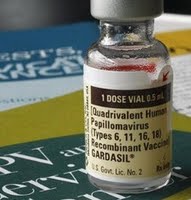Study on adverse effects Gardasil reveals two adverse effects are more common than was expected

Philadelphia, PA
Three years after the world's first cervical-cancer vaccine was hailed as a public-health breakthrough, Gardasil is facing renewed questions about its safety and value.
In today's Journal of the American Medical Association, federal researchers analyze 12,424 voluntary reports of post-vaccination "adverse events" ranging from headaches to deaths. They conclude that only two complaints - fainting and dangerous blood clots -- are more common than expected and may be related to the immunization.
But an accompanying editorial points out that many questions about Gardasil remain - key among them, whether it really will reduce the toll of cervical cancer.
Another opinion piece in JAMA looks at Merck & Co.'s marketing strategy, contending the company coopted professional medical societies to promote and recommend the vaccine.
Merck - already on the defensive over Gardasil's second-quarter sales, which slumped sharply in the United States and worldwide - said in a statement that "we welcome continued study and discussion" of the product's safety.
"The bottom line is that Gardasil has a very positive benefit-risk profile," Richard M. Haupt, head of Merck's clinical program for the vaccine, said in an interview.
Gardasil, a series of three shots, protects against two strains of the sexually transmitted human papillomavirus (HPV) that cause 70 percent of cervical-cancer cases. Gardasil also wards off two other HPV strains that cause 90 percent of genital warts in men and women.
Next month, advisers to the Food and Drug Administration will consider whether to recommend expanding Gardasil's current approval for females ages 9 to 26 to include males of the same age. Vaccinating men would reduce HPV transmission to women and protect men from very rare HPV-related anal, head, and neck cancers.
The FDA panel will also review data on would-be rival Cervarix, the cervical-cancer vaccine for which GlaxoSmithKline is seeking FDA approval. Cervarix does not protect against genital warts.
Although the theory behind these vaccines is sound - if you prevent HPV infection, you prevent cervical cancer - the reality is more complex, infectious-disease expert Charlotte Haug wrote in the JAMA editorial.
No one knows whether Gardasil will require booster shots, or whether suppressing the two main cancer-causing HPV strains will drive rarer, equally dangerous strains to fill the void. That is why vaccinated women still need to get Pap smears, the routine screening test that can catch precancerous changes years before they turn malignant.
Most of the world's 250,000 cervical-cancer deaths each year occur in poor countries. Screening has made the disease relatively rare in the United States, where there are 10,000 new diagnoses and 3,700 deaths each year.
In Haug's view, the overall benefit of vaccination is so uncertain that a regularly screened woman "should be willing to accept only a small risk of harmful effects." More >>
Failure to Diagnose Cervical Cancer Malpractice
Labels: Cervical Cancer Prevention, Cervical Cancer Vaccine, Gardasil

0 Comments:
Post a Comment
<< Home